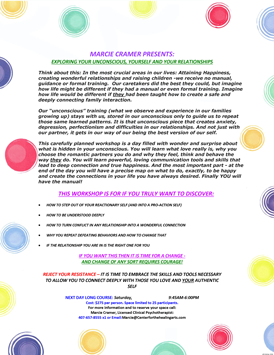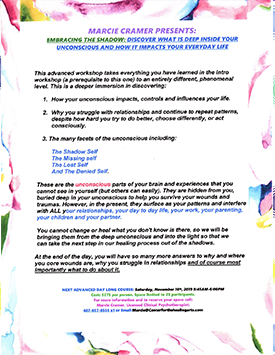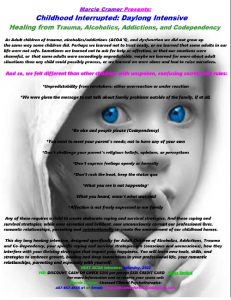ACoA - From Confusion to Freedom
Center for the Healing Arts pioneered the Adult Children of Alcoholics (ACoA) movement in this region. If you grew up with an alcoholic parent or caretaker, or suspect that your childhood environment was affected by addiction, we can help you to understand and to heal.
Adult children of Alcoholics/Addiction/Dysfunction (ACOA) do not grow up the same way as other children; we did not learn what other children learned and we learned far more about adult situations than any child could possibly process. While we might perform outstanding in a crisis situation (since we grew up in crisis and are thus trained to do so), we might not function well in the day-by-day process of performing life skills in parenting in relationships (ACOA’s relationship model was woefully lacking) or in social situations (ACOA’s tend to either over-react or under-react as we have no imprinting for stable reactions).
Navigating Life as an ACOA:
What defines Adult Children of Alcoholics/Addiction/Dysfunction and How do we Heal?
Do you see yourself in any of these common ACOA thoughts and struggles:
“I don’t even know what it feels like to be ‘normal’.”
“I can never finish anything! I’m such a failure.”
“I feel so out of control!”
“I’ll never find the right person, what is wrong with me?”
“It is very difficult for me to trust.”
“I’m not sure where I really belong.”
“I wish I could just relax and not be so hard on myself.”
If you see yourself in any of these statements, you most likely, brilliantly, developed a variety coping mechanisms to protect yourself from the chaos and the pain that comes from growing up in the addicted family. These patterns were brilliant as a child, and they worked well in providing the stability and safety we are craving as children. However, in the present they have outlived their usefulness in day-to-day living. They prevent us from knowing how to have a deeply loving and connected sense of self. Unfortunately, these patterns of protection are so ingrained they continue to be our “go to’s” when people and situations trigger strong emotions in us as adults. This process is unconscious and automatic. They are rooted in layers of wounding from our childhood experiences in navigating the chaos that is the addicted family dynamic. This is NOT YOUR FAULT!
Maya Angelou said, “We do what we know. When we know better, we do better.”
Understanding that as a child we were completely innocent, that what occurred in childhood did happen to us, but it doesn’t HAVE TO define us, is the first step in healing and creating the healthy and invigorating lives we deserve to live. The ACOA Treatment Center is a soft place to land that can help you heal this trauma.
Based on the research, it is generally agreed upon that there are upwards of 20 million alcoholics/addicts in this country alone. Substance abuse/addiction affects one out of every two families. It creates heartbreak and broken lives. It leads to violence, sexual abuse, crime, depressions, loss of income, and loss of jobs. It invades the work place, creates separation of parents and children, feelings of hopelessness, serious money problems, divorce, single parenthood, bad/abusive relationships, and long-term emotional and behavioral difficulties in children.
Children of alcoholics and addiction are forced to experience a depth of abandonment, abuse (sexual, physical and emotional), and confusion that are not present in “normal” households. These children grow into adults that tend to unconsciously recreate the environment of their childhood home. They cannot separate the past from the future and tend to either marry alcoholics/addicts or become one themselves.
While a great deal of time is spent focusing on the alcoholic/addict in the family, these children and their experiences are overlooked or forgotten.
Janet G. Woititz, was one of the very first to examine how this childhood affects adulthood. In her research she demonstrated the link between the trauma children in alcoholic/addict homes suffer and its impact on them later in life. Interestingly enough, her research showed how ACOA’s felt about themselves in their family of origin, was not significantly different in how they feel about themselves as adults irrespective of their accomplishment.
At the Adult Children of Alcoholics/Addiction/Dysfunction Treatment Center we help process the subtle and overt trauma that growing up in a home with addictions can cause. We will help you explore the ramifications of it in yourself, in your relationships and in your family today. We help identify what behaviors can be linked to the patient’s childhood coping mechanisms and what steps will be taken to heal and grow for a different outcome.
Janet Geringer Woititz, Ed.D. outlined the main 13 common characteristics of Adult Children of Addiction in her book Adult Children of Alcoholics:
1. ACoA guess at what normal behavior is.
2. ACoA have difficulty following a project through from beginning to end.
3. ACoA lie when it would be just as easy to tell the truth.
4. ACoA judge themselves without mercy.
5. ACoA have difficulty having fun.
6. ACoA take themselves very seriously.
7. ACoA have difficulty with intimate relationships.
8. ACoA over-react to changes over which they have no control.
9. ACoA constantly seek approval and affirmation.
10. ACoA usually feel that they are different from other people.
11. ACoA are super responsible or super irresponsible.
12. ACoA are extremely loyal, even in the face of evidence that the loyalty is underserved.
13. ACoA are impulsive.
At the Center for the Healing Arts, we developed the Adult Children of Addiction Treatment Center, which includes a variety of treatment options to help on your healing journey. One of these options are our ACoA Therapy Groups.
These groups are about healing through the post-traumatic stress syndrome that being ACOA causes. This PTSD, that sometimes is very subtle, can prevent us from living happy, fulfilling, enriching lives. These psychotherapy groups differ from the local ACA (Adult Children of Alcoholics) support groups. A support group is typically led by a member of the group, and a variety of topics are discussed during these groups. A lot of these groups (like ACA, AA, NA, Ala-non, etc) have step work that help to challenge current behaviors and thoughts and are fabulous places to know you are not alone. However, group psychotherapy is quite different in that it is led by a psychotherapist who understands ACOA issues on the unconscious level and has the tools and skills to help you heal and grow, creating lasting change on the inside.
Please feel free to give us a call with any questions you might have. Many of our psychotherapists are ACOA themselves so they understand it not only professionally…but from experience.
You might be able to cope with this all by yourself, but you know longer have to.





